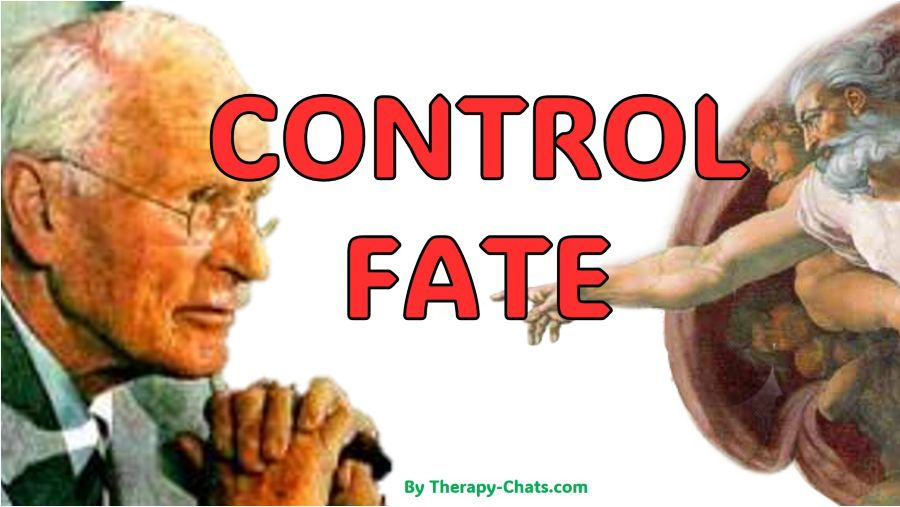Do You Want to Control Your Fate?
- Mar 13, 2025
- 7 min read
Updated: Jan 13

Is your life’s path pre-written? For millennia, humanity has wrestled with this question, looking outwards for an answer. We’ve looked to the stars, to the concept of destiny, to the hand of God or a Supernature Force arranging the pieces of our lives on a grand chessboard. We feel the pull of events and wonder who, or what, is doing the pulling.
But what if the most powerful force shaping your destiny isn't in the heavens, but in the hidden depths of your own mind? What if the "fate" you feel is actually a psychological pattern, an invisible script you follow without realizing you are its author?
Think about it. Does any of this feel familiar?
That recurring relationship pattern, where you find yourself dating the same person in a different body, leading to the same inevitable heartbreak.
That invisible ceiling in your career, where the same anxieties or self-doubts emerge just as you’re about to level up.
That familiar brand of family drama that seems to replay with perfect precision at every holiday gathering.
If you feel like you are living in a loop, you are not alone, and you are not imagining things. You are experiencing the direction of a powerful, unseen guide. The great pioneer of depth psychology, Carl Jung, put it best:
"Until you make the unconscious conscious, it will direct your life and you will call it fate."
This single, earth-shattering idea reframes the entire question. It suggests that the script isn't written by an external force. It’s written internally, and the pen is in the hand of your own unconscious mind. The path to freedom, then, isn’t about changing your stars, but about understanding your mind.
The Architect Revealed - Understanding the Unconscious Shadow
If your conscious mind—the part of you reading these words, making decisions, and setting goals—is the captain on the bridge of your ship, then the unconscious is the vast, silent engine room that powers the entire vessel. It operates 95% of the machinery without the captain ever needing to intervene.
This isn't just a philosophical idea; it's a neurological reality. Scientific studies estimate that a staggering up to 95% of our brain activity occurs in subconscious or unconscious minds. As the cognitive neuroscientist Dr. John Kihlstrom highlights, “most of our mental life goes on beneath the surface of conscious awareness.”
Within this vast unconscious realm, one of the most powerful and active players is what Jung called the Shadow. The Shadow is the psychological bag we’ve been carrying since birth. Into it, we place every part of ourselves we were taught to disown in order to fit in, be loved, or stay safe. It’s the collection of all our rejected traits, impulses, and desires.
But here is the crucial insight most people miss: The Shadow isn't just the "dark" stuff we see in movie villains—rage, jealousy, greed, and selfishness. It also contains our "Golden Shadow": the brilliant, powerful parts of ourselves we were taught to suppress. This could be your:
Untapped creativity, dismissed as "daydreaming" in childhood.
Fierce assertiveness, shamed as being "bossy" or "difficult."
Profound vulnerability, hidden away after being told to "toughen up."
Blazing ambition, tamped down so as not to outshine others.
Think of the Shadow as a locked room in the house of your psyche. You might have lost the key long ago, but the resident inside hasn't gone anywhere. And the more you ignore it, the louder it bangs on the door, determined to be heard. The question is, how does it make itself known? The answer lies in the most fascinating and consequential of all psychological mechanisms: projection.
The Movie Projector - How the Shadow Runs Your Life
So, if the Shadow is locked away in the unconscious, how does it exert so much control? It does so through a fascinating and powerful psychological mechanism: PROJECTION.

Imagine your mind is a movie projector. The film running through it is your own unconscious content—your hidden beliefs, fears, and disowned strengths. The outside world then becomes the screen. You believe you are watching an objective reality, but you are actually watching the movie from inside your own head played out in front of you.
As the philosopher Anaïs Nin so elegantly stated:
"We don't see things as they are, we see them as we are."
This isn't a metaphor; it's the operating manual for our daily experience. Projection is how the Shadow ensures we are constantly interacting with it, whether we know it or not.
In Your Relationships:
Projection is the secret engine of relational dynamics. That intense, almost chemical reaction you feel towards someone—positive or negative—is often a projection.
That person you are instantly in awe of for their confidence and charisma? You are likely projecting your own "Golden Shadow"—the powerful, radiant self you were taught to dim down.
The Shadow shows up is through emotional triggers if you feel a strong reaction to someone's confidence for example, it could be a sign that you've buried your own desire to be confident.
The co-worker whose arrogance drives you mad? You may be projecting your own disowned ambition or a secret fear of being seen as arrogant yourself.
We unconsciously cast the people in our lives to play the roles of our disowned parts. This is why we get stuck in patterns, choosing partners who force us to confront the very pieces of ourselves we've tried to abandon.
In Your Emotional Life:
Your strongest emotional reactions are signposts pointing directly to your Shadow. A reaction that is out of proportion to the event is a projection in action. When you feel that surge of rage at a slow driver, that withering judgment for a friend's life choice, or that intense envy over someone's success, stop and ask: Is this really about them? The answer is almost always no. You are not reacting to the situation; you are reacting to your Shadow, which the situation has just activated.
In Your "Fate":
This is where it all comes together. If your Shadow contained a deep-seated belief that you were not worthy of success, you would project that unworthiness onto the world. You would perceive bosses as dismissive, opportunities as unattainable, and colleagues as threats. You would then act in ways that confirm this reality, subtly sabotaging your own progress and thereby "fulfilling" a fate you unconsciously wrote for yourself.
Taking Back the Remote - How to Change Your Unconscious Script
If our mind is the projector, the path to freedom isn't about trying to scrub the screen; it's about changing the film. This is the courageous work of making the unconscious conscious. It is a process of self-reclamation, often called "Shadow work." It can be broken down into three powerful steps.
Step 1: Notice the Charge (The Flashlight of Awareness)
You cannot change what you do not see. The first step is to become a detective of your own inner world. The primary clue is always a strong emotional charge. When you feel a disproportionate surge of anger, judgment, irritation, envy, or even infatuation, that's your signal. Instead of immediately blaming the external trigger, turn the flashlight of your awareness inward. Ask the most important question:
"Why is this affecting me so intensely?"
Step 2: Own the Trait (Withdrawing the Projection)
This step requires honesty and courage. Once you've identified a charged reaction, you must consider how the trait you see in the other person triggering you with strong emotions might also be a part of you.
If you judge someone as "lazy," ask: "Where in my life am I being 'lazy,' or where do I desperately need to rest but won't allow myself to?"
If you admire someone's "freedom," ask: "What part of my own freedom have I sacrificed?"
This is not about blame, but about radical self-ownership. It is the modern application of the ancient wisdom inscribed at the Temple of Apollo at Delphi, a foundation of all philosophy:
"Know thyself." - Socrates
Step 3: Integrate the Shadow (Finding the Gold)
The final step is to welcome these lost parts home. The goal is not to eliminate your Shadow but to integrate it, bringing its raw energy into the light of consciousness where it can serve you. Every shadow trait has a "gold" hidden within it.
The rage you've suppressed is the raw energy for passion, boundaries, and justice.
The fear you've avoided is a signpost telling you what truly matters to you.
The laziness you've judged is the key to restorative rest and being, rather than constantly doing.
This is a healing journey of becoming whole. It is, as the poet Rumi so beautifully wrote, a process of letting the light in through our deepest wounds.
"The wound is the place where the Light enters you." – Rumi
Conclusion - From "Uncontrolled Autopilot" to "Conscious Architect"
We are not passive victims of a predetermined fate written in the stars. We are, for the most part, living out a script written by our own unconscious mind. And the script can be changed.
By understanding the power of our Shadow and learning to recognize its projections, we reclaim the pen. We shift from being the actor reading lines on uncontrolled autopilot to becoming the conscious architect of our own lives. The recurring patterns begin to dissolve, our relationships deepen with authenticity, and the "invisible walls" reveal themselves to have been mirrors all along.
This journey of self-discovery is one of the most rewarding endeavors a person can undertake. It is also profound, challenging, and not always easy to do alone. Unpacking these deep-seated patterns requires a safe, confidential, and non-judgmental space—a place where you can explore your thoughts and feelings without the fear of the very projections you are trying to understand.
You don't have to navigate the complex, often turbulent waters of your own unconscious alone. You can have a dedicated and private space to do the work.
Begin the journey of reclaiming your script today. Explore the confidential space offered at Therapy-Chats.com where assists you in turning your unconscious patterns into conscious choices.



Comments